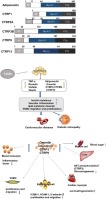当前位置:
X-MOL 学术
›
Cytokine Growth Factor Rev.
›
论文详情
Our official English website, www.x-mol.net, welcomes your feedback! (Note: you will need to create a separate account there.)
The potential of adipokines as biomarkers and therapeutic agents for vascular complications in type 2 diabetes mellitus.
Cytokine & Growth Factor Reviews ( IF 13.0 ) Pub Date : 2019-06-15 , DOI: 10.1016/j.cytogfr.2019.06.002 Wei Liang 1 , Dong Dong Ye 2
Cytokine & Growth Factor Reviews ( IF 13.0 ) Pub Date : 2019-06-15 , DOI: 10.1016/j.cytogfr.2019.06.002 Wei Liang 1 , Dong Dong Ye 2
Affiliation

|
Over the past decades, there has been a major increase in type 2 diabetes (T2D) prevalence in most regions of the world. Diabetic patients are more prone to cardiovascular complications. Accumulating evidence suggests that adipose tissue is not simply an energy storage tissue but it also functions as a secretory tissue producing a variety of bioactive substances, also referred to as adipokines. The balance between pro-inflammatory adipokines and protective adipokines is disturbed in type 2 diabetes, this can be regarded as adipose tissue dysfunction which partly promote the pathogenesis of diabetes complications. In this review, we not only discuss the favorable adipokines like adiponectin, omentin, C1q tumor necrosis factor-related proteins, but also unfavorable ones like resisitin and visfatin, in the aim of finding potential biomarkers recommended for the clinical use in the diagnosis, prognosis and follow up of patients with T2D at high risk of developing cardiovascular diseases as well as leading to new therapeutic approaches.
中文翻译:

脂肪因子作为2型糖尿病血管并发症的生物标志物和治疗剂的潜力。
在过去的几十年中,世界上大多数地区的2型糖尿病(T2D)患病率都出现了大幅增长。糖尿病患者更容易发生心血管并发症。越来越多的证据表明,脂肪组织不仅是能量存储组织,而且还充当分泌组织,产生各种生物活性物质,也称为脂肪因子。在2型糖尿病中,促炎性脂肪因子和保护性脂肪因子之间的平衡受到干扰,这可以被认为是脂肪组织功能障碍,部分促进了糖尿病并发症的发病机理。在本文中,我们不仅讨论了脂联素,脂联素,网膜蛋白,C1q肿瘤坏死因子相关蛋白等有利的脂肪因子,而且还讨论了树脂脂和visfatin等不利的脂联素,
更新日期:2019-11-18
中文翻译:

脂肪因子作为2型糖尿病血管并发症的生物标志物和治疗剂的潜力。
在过去的几十年中,世界上大多数地区的2型糖尿病(T2D)患病率都出现了大幅增长。糖尿病患者更容易发生心血管并发症。越来越多的证据表明,脂肪组织不仅是能量存储组织,而且还充当分泌组织,产生各种生物活性物质,也称为脂肪因子。在2型糖尿病中,促炎性脂肪因子和保护性脂肪因子之间的平衡受到干扰,这可以被认为是脂肪组织功能障碍,部分促进了糖尿病并发症的发病机理。在本文中,我们不仅讨论了脂联素,脂联素,网膜蛋白,C1q肿瘤坏死因子相关蛋白等有利的脂肪因子,而且还讨论了树脂脂和visfatin等不利的脂联素,



























 京公网安备 11010802027423号
京公网安备 11010802027423号